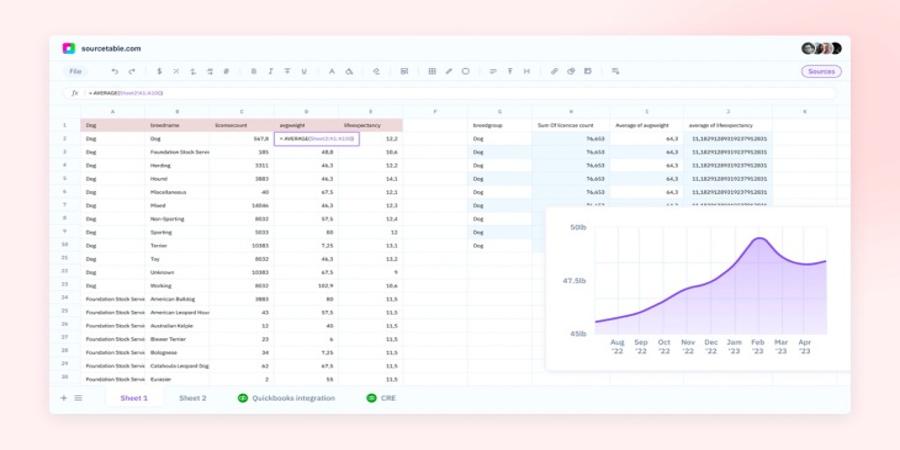Spreadsheets. They’re probably not what you’d call the most exciting piece of software going; it seems like a third of all startup pitches has “spreadsheets” in the “look how ridiculous, this is how how people solve this problem now” part of the narrative. It can’t be denied that they’re the workhorse of the corporate world, and as well as Microsoft Excel works, as hard as Google Sheets tries and as intensely as we try to forget Apple Numbers even exists, there is plenty of space for improvement.
Spreadsheets can handle straightforward data organization. They’re used for financial models, inventory management and keeping track of who brings the extra gas for the generator at your Burning Man camp, just to pick a couple of random examples. There are millions of us who use them in thousands of different ways. Still, they can be slow, frustrating and underpowered. That’s why Eoin McMillan, recognizing just how critical spreadsheets are and how much better they can be, founded Sourcetable, to build “the world’s best spreadsheet”.
Sourcetable has just closed $3 million in seed funding, following a $1.25 million pre-seed funding round, led by Michael Berolzheimer of Bee Partners to push forward with this mission. Also found on Sourcetable’s cap table are NextView Ventures and Long Journey Ventures.
In taking on the spreadsheet challenge, Sourcetable is going cell-to-cell with not just two of the biggest names in tech, but two of the biggest and most recognizable businesses in the world: Microsoft with Excel and Google with Sheets. That is an enormous undertaking, so what drives McMillan to take them on?
The integrations on the right hint at one of the major focuses in Sourcetable: The ease of adding new external data sources. Image Credits: Sourcetable
The integrations on the right hint at one of the major focuses in Sourcetable: The ease of adding new external data sources. Image Credits: Sourcetable
“Spreadsheets are one of the core units of cognition for modern humans,” said McMillan in an interview with TechCrunch. “They are so prevalent in our work life that they are like water in the digital age. Unfortunately, that water has stagnated due to a lack of innovation from the duopoly of Microsoft and Google; Excel is a dinosaur from the pre-web era and Google Sheets is unfortunately an underpowered veneer of what was possible from a web-native spreadsheet (they got collaboration right, but then stopped iterating). The trillion-dollar incumbents have abdicated their responsibility as innovators and failed to carry the torch.”
McMillan knows how important spreadsheets are, and is certain that there is a better version to be built. His experience has told him that if he’s going to get the spreadsheet right, then he needs to start from the bottom and work up.
“I tried solving ‘the spreadsheet problem’ inside and out with code and through non-technical means,” said McMillan. “We were even paid to build multiple spreadsheet-based database access tools for clients. We concluded that it’s just not possible to take big leaps forward with existing solutions: you need to own the interface, and you need to own the data stack in order to make progress. That means designing and building a new spreadsheet from the ground up.”
In building a spreadsheet from the ground up, what does Sourcetable include?
“We’ve packed in a lot into the product,” said McMillan, “including charts, graphs, pivots, real-time document collaboration, data syncing to over 100 business applications, data warehousing, a SQL GUI and SQL editor for querying large datasets, publishing features and all the spreadsheet formulas, shortcuts and cell-based notation that people expect from Excel and Sheets.”
So where does Sourcetable go from here, and what does its funding help it to develop and deliver?
“What they want is pretty consistent,” said McMillan. “More integrations, more templates and ever-better analysis, reporting and collaboration features. So that’s what we’re going to focus on.”
In terms of how the company is set to grow, Sourcetable is looking to build a world-class team and expand its market by reaching new customers. In particular, those customers look like professionals who want and need to be able to access and manipulate significant data, for example those who work in sales, accounting, finance, support and HR.
Sourcetable has been operating effectively in stealth mode and won’t come out of private beta until the end of the year, McMillan told TechCrunch. However, if you’re interested in joining its waiting list you can do so here, while Sourcetable refines its offering based on the user feedback it’s receiving to create a product that it hopes consumers will love.
Source @TechCrunch



